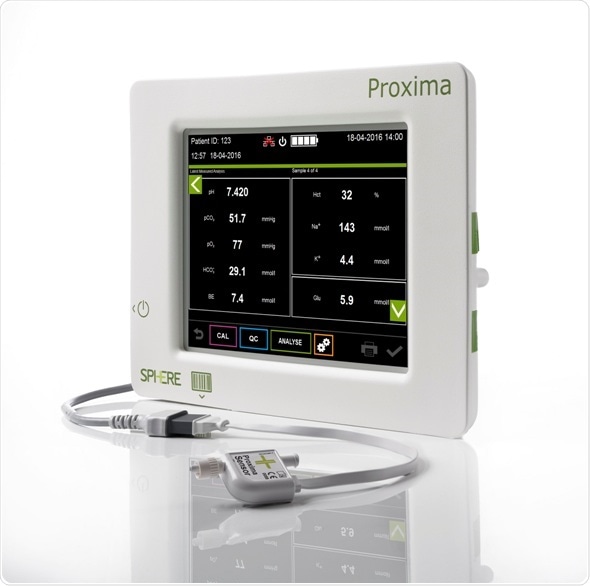Dec 17 2016
Sphere Medical, an innovative company in critical care monitoring and diagnostics equipment, has launched its next generation CE-marked Proxima™ system. This unique bedside blood gas analyser (BGA) incorporates a new design and an extended analyte panel. Parameters now added to the new system include glucose and calculated parameters, such as P/F ratio and temperature corrected gases. The ability to monitor blood gases and measure blood glucose frequently and easily, directly by the patient, can enable earlier interventions and closer patient management, which is vital in fast changing critical situations.

The next generation Proxima™ patient dedicated in-line blood gas monitoring system
As a patient dedicated system, Proxima is always connected to the patient via their arterial line and ready to go instantly. Since results are also delivered without the caregiver leaving the patient’s bedside, this significantly reduces time to result compared to conventional benchtop analysers. Its novel design means the system can travel with the patient on their pathway through the hospital. This is possible since the Proxima sensor contains an array of proven biosensor technology on a silicon chip, each a miniaturised version of the electrochemical sensors used in a traditional blood gas analyser.
In addition to the sensor, the next generation Proxima system includes a medical grade tablet monitor with an intuitive touchscreen user interface. All results are reported to the monitor and seamlessly transferred directly into laboratory information systems and electronic patient records. This is a key requirement for the successful implementation of point-of-care (POC) testing.
As an ex-vivo analyser operating as a closed system, blood is drawn directly from the patient and over the Proxima sensor. Following analysis, all blood is returned to the patient, meaning that there is no blood loss and risk of iatrogenic anaemia is reduced. Furthermore, infection risk to staff and patients is minimised as the arterial line remains closed throughout sampling. The design of Proxima also reduces pre-analytical errors due to the delivery of a high integrity blood sample direct to the sensor for immediate analysis with no mixing or anti-coagulant required.
The addition of glucose to the new Proxima’s analyte panel is significant as glucose measurements play a key part in the care of critically ill patients. Both hyperglycaemia and hypoglycaemia are associated with increased morbidity and mortality in intensive care unit (ICU) patients. Keeping patients in normal glycaemic range is difficult with current systems. The ability to regularly monitor arterial blood glucose using Proxima will support closer clinical management for improved glycaemic control.
“Proxima is already redefining how arterial blood gas testing is carried out in critically ill patients through its use for the close monitoring of patients in the UK, Germany and Belgium,” said Dr Wolfgang Rencken, Chief Executive Officer, Sphere Medical. “Based on clinical feedback, we have launched our next generation Proxima which is now even better placed to support rapid and frequent measurements of blood gases, electrolytes and metabolites without blood loss. The addition of glucose to the analyte panel is the most significant new parameter, enabling better glycaemic control in the critically ill.”
Professor of Anaesthesia and Intensive Care Medicine, Mike Grocott, University of Southampton, also commented:
The recent time and motion study we conducted at University Hospital Southampton clearly highlighted the workflow benefits of using Proxima on critically ill, unstable patients. We look forward to the launch of the new Proxima and the opportunity to use this device on a larger patient group within the ICU.